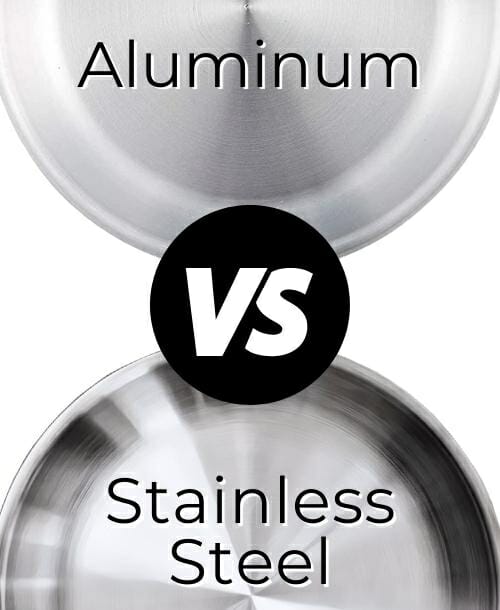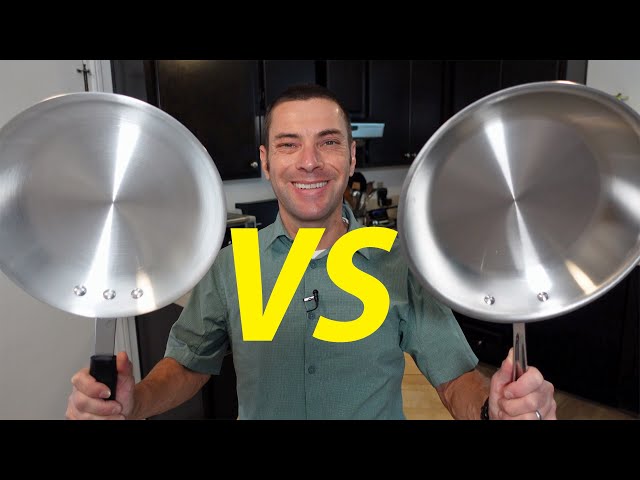Stainless steel cookware is generally more durable and less reactive than aluminum. Aluminum heats faster but stainless steel is better for even cooking.
Which is Better Cookware:Choosing between aluminum and stainless steel cookware depends on your cooking needs and preferences. Both materials offer unique benefits that can enhance your culinary experience. Aluminum is known for its excellent heat conductivity, making it ideal for chefs who prioritize speed and energy efficiency.
On the other hand, stainless steel is celebrated for its strength and resistance to rust and corrosion, ensuring longevity in your kitchen. It’s also non-reactive, which means it won’t alter the taste of acidic foods, a significant advantage for those who cook with tomatoes, wine, or citrus regularly. The choice between aluminum and stainless steel cookware ultimately boils down to your specific requirements, whether you value quick heating or long-term resilience.

Credit: prudentreviews.com
Introduction To Cookware Choices
Navigating the world of cookware can be complex, especially when deciding between aluminum and stainless steel options. Each material offers unique benefits for cooking, making the choice crucial for kitchen enthusiasts.
Kitchen gear matters. Chefs know this. Home cooks learn it. The right pot or pan transforms cooking. It turns recipes into meals to remember.
The debate is old but vital: Aluminum versus Stainless Steel. Both materials have fans. Both have unique traits. This post dives into that culinary clash.
Aluminum Vs. Stainless Steel: A Culinary Showdown
| Feature | Aluminum | Stainless Steel |
|---|---|---|
| Heat Conductivity | Excellent | Varies |
| Durability | Good | Stronger |
| Reactivity | Yes, with acidic foods | Minimal |
| Maintenance | Higher | Lower |
The Importance Of Selecting The Right Material
- Heat distribution affects cooking.
- Food taste can change with different materials.
- Durability means long-term value.
- Easy maintenance saves time.
The Heat Conductivity Factor
Understanding the heat conductivity factor is essential when selecting the right cookware.
Heat conductivity influences how quickly and evenly your food cooks.
This factor varies between aluminum and stainless steel cookware, affecting cooking performance.
Aluminum For Quick Heating
Aluminum cookware is known for its superior heat conductivity.
It heats up fast and efficiently.
This makes aluminum ideal for boiling water or cooking meals that require a quick heat-up.
- Lightweight and easy to handle
- Heats up almost instantly
- Not as durable as stainless steel
Stainless Steel For Even Cooking
Stainless steel cookware offers even heat distribution.
It prevents hot spots that can burn food.
Stainless steel takes longer to heat but maintains temperature well.
- Durable and resists warping
- Provides consistent cooking results
- May require a little oil or water to prevent sticking
Durability And Longevity
Choosing the right cookware impacts how your food cooks and lasts. Cookware varies in durability and longevity. Some materials withstand time and use better than others. Let’s explore the resilience of stainless steel and aluminum cookware.
Stainless Steel’s Robust Composition
Stainless steel is famous for its durability. This cookware rarely dents, warps, or scratches. It’s made with a blend of metals including chromium and nickel. These metals give stainless steel its strength. The material can handle high heat without damage. It’s also resistant to rust and corrosion. This means your stainless steel pots and pans can last for decades with proper care.
Aluminum’s Wear And Tear Considerations
Aluminum cookware is lighter than stainless steel. It heats up quickly and evenly. But, it’s not as tough. Aluminum can dent and scratch more easily. Over time, it may also warp if exposed to high heat. Aluminum can react with acidic foods, which may degrade the cookware faster. However, many aluminum pots and pans have a non-stick coating. This layer can wear off with time and use. Thus, aluminum cookware often has a shorter lifespan than stainless steel.

Credit: resources.centralrestaurant.com
Health And Safety Concerns
Choosing the right cookware is crucial for health and safety. Certain materials react with food. This affects both taste and nutritional value.
Aluminum’s Reaction With Acidic Foods
Aluminum cookware is lightweight and conducts heat well. But, it has drawbacks. Acidic foods like tomatoes can cause aluminum to leach into food. This may pose health risks over time. The metal’s reaction alters the flavor and appearance of dishes.
- Acidic foods include tomatoes, citrus, and vinegar.
- Leaching can lead to a metallic taste.
- Long-term exposure to leached substances is a concern.
Stainless Steel As A Non-reactive Option
In contrast, stainless steel cookware stands out as a safer option. It does not react with food, even when cooking acidic ingredients. This makes it a more stable choice for everyday cooking.
| Feature | Aluminum | Stainless Steel |
|---|---|---|
| Reactivity | High with acids | Low |
| Taste Alteration | Possible | Minimal |
| Health Safety | Concerns exist | Generally safe |
Stainless steel’s non-reactive nature means no unwanted chemicals in your food. It maintains the food’s flavor and nutritional integrity.
Maintenance And Care
Choosing the right cookware often boils down to its maintenance and care. Between stainless steel and aluminum options, each has its own cleaning regimen and care guidelines. Understanding these can help keep cookware in top condition, ensuring longevity and consistent cooking performance.
Ease Of Cleaning Stainless Steel
Stainless steel is renowned for its ease of cleaning. This durable material can withstand a variety of cleaning methods. Here’s a simple guide:
- Use warm water and soap.
- For tougher stains, apply baking soda paste.
- Rinse and dry immediately to avoid water spots.
- Dishwashers are safe for stainless steel.
With proper care, stainless steel can resist corrosion and maintain its shine.
Caring For Aluminum To Prevent Damage
Aluminum cookware requires a bit more attention. Avoid dishwasher use as it can cause oxidation. Follow these steps:
- Hand wash with mild detergent.
- Use non-abrasive sponges.
- Dry thoroughly after washing.
- Store properly to prevent scratches.
Anodized aluminum, a special type, is more durable. It withstands harsher cleaning but still benefits from gentle care.
Regular maintenance ensures both stainless steel and aluminum cookware remain reliable kitchen allies.
Cost Comparison
When choosing between aluminum and stainless steel cookware, cost is key. This section dives into the price aspects to help you decide. Let’s compare the costs of both materials.
Initial Investment Vs. Long-term Value
Aluminum cookware often has a lower price tag. Its affordability makes it a popular choice for those on a budget. Stainless steel options tend to be pricier. But they boast durability that can lead to savings over time.
| Material | Initial Cost | Long-Term Value |
|---|---|---|
| Aluminum | Lower | May require replacement sooner |
| Stainless Steel | Higher | Long-lasting with proper care |
Finding Quality Within Your Budget
Good news: You can find high-quality options in both materials. Even with a tight budget, you don’t need to sacrifice quality. Seek out deals and compare brands.
- Aluminum – Look for hard-anodized versions for better performance.
- Stainless Steel – Choose 18/10 stainless steel for optimal quality.
Remember, the right choice balances cost with cooking needs. Think about how often you cook and what you make. This will guide your decision on the best cookware investment.
Aesthetic Appeal In The Kitchen
The kitchen is the heart of the home. It’s where meals come to life. The right cookware not only performs well but also adds style. Cookware choices affect the look and feel of your kitchen. Aluminum and stainless steel bring their unique flair. Let’s explore their visual impact.
The Sleek Look Of Stainless Steel
Stainless steel cookware shines in modern kitchens. Its mirror-like finish reflects light beautifully. This creates a bright and airy space. These pots and pans offer a timeless elegance. They complement any color scheme and design. Stainless steel’s durability also means it keeps its luster for years. It’s a long-term investment in your kitchen’s beauty.
Aluminum’s Modern And Professional Finish
Aluminum cookware boasts a professional-grade appearance. It’s what you often see in restaurant kitchens. Its matte finish offers a contemporary look. Aluminum is lightweight and heats up quickly. This makes it a favorite among chefs. Its modern vibe is perfect for those who love to cook and entertain.
Making The Right Choice For Your Cooking Needs
Selecting the right cookware is crucial for any kitchen. It affects food taste, cooking efficiency, and health. Understanding the differences between aluminum and stainless steel is key. This guide helps make an informed decision based on your cooking style.
Considering Cooking Habits And Preferences
- Aluminum cookware is lightweight and heats quickly.
- It’s ideal for even heat distribution, preventing hot spots.
- Stainless steel offers durability and resistance to rust.
- It’s preferred for searing and browning foods.
Think about what you cook often. Do you value quick heating or robust cookware? Your preference will influence your choice.
The Verdict: Balancing Pros And Cons
| Aluminum | Stainless Steel | |
|---|---|---|
| Heat Conductivity | Excellent | Good |
| Durability | Less | More |
| Maintenance | More | Less |
| Price | Lower | Higher |
Choose aluminum for quick cooking and affordability. Opt for stainless steel for strength and low maintenance. Your cooking habits and budget decide the best option for you.

Credit: thegoodlifedesigns.com
Frequently Asked Questions
Is It Better To Cook In Aluminum Or Stainless Steel?
Choosing between aluminum and stainless steel cookware depends on your cooking needs. Aluminum heats quickly, ideal for fast cooking. Stainless steel offers durability and even heat distribution, perfect for varied cooking styles. Consider your cooking preferences for the best choice.
Do Chefs Use Aluminum Or Stainless Steel?
Chefs commonly use both aluminum and stainless steel cookware for their heat conductivity and durability. Each material has unique advantages for different cooking techniques.
What Is The Healthiest Metal For Cookware?
Stainless steel and cast iron are considered the healthiest cookware materials. They’re durable, non-toxic, and efficiently conduct heat.
What Is The Healthiest Cooking Pots To Use?
Stainless steel, ceramic, and cast iron pots are among the healthiest cooking options. They offer durability and minimal chemical leaching, ensuring safer meals. Opt for these materials to prioritize health in your kitchen.
Conclusion
Choosing between aluminum and stainless steel cookware depends on your cooking needs. Aluminum heats quickly, ideal for fast meals. Stainless steel offers durability and even cooking, perfect for complex dishes. Consider your kitchen habits and recipe requirements before making a decision.
Both materials have their merits, ensuring your culinary adventures are well-equipped.




Leave a Reply